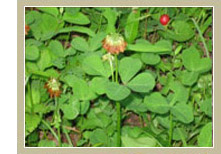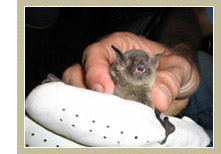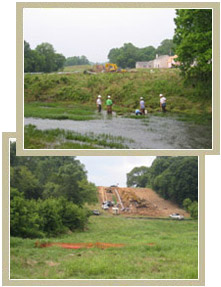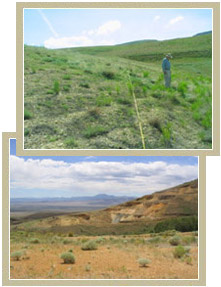|
|
 |
 |
 |
 |
 |
 |
 |
 |
 |
Redwing performs ecological surveys in the midwest, southeast and western U.S. This experience with a broad diversity of habitat types and species helps meet clients' needs in a variety of settings.
|
 |
|
|
 |
 |
 |
 |
 |
 |
 |
|
Redwing's ability to address ecological issues in a proactive and efficient manner is also based on a strong working relationship with numerous U.S. Fish and Wildlife Service regional and field offices, as well as many state wildlife agencies. Redwing professionals have specialized training/experience and are certified to survey for threatened/endangered species including Indiana bat (Myotis sodalis), gray bat (Myotis grisescens), freshwater mussels, and running buffalo clover (Trifolium stoloniferum). |
 |

|
|
OLD HENRY ROAD INTERCEPTOR ECOLOGICAL ASSESSMENT
JEFFERSON COUNTY, KENTUCKY
|
 |
This project included ecological assessment of a proposed five-mile sewerline installation in eastern Jefferson County for the Louisville and Jefferson County Metropolitan Sewer District. Services provided were identification of natural habitats, jurisdictional water/wetland areas, threatened/endangered species and other key ecological features within the project corridor. This project also included protected species habitat surveys for the Indiana bat (Myotis sodalis) and running buffalo clover (Trifolium stoloniferum).
|
|
|
|
 |

|
|
US 31E REALIGNMENT ENDANGERED BAT SURVEY
BULLITT, NELSON AND SPENCER COUNTIES, KENTUCKY
|
 |
Mist net surveys for the federally endangered Indiana bat (Myotis sodalis) and gray bat (Myotis grisescens) were performed throughout a 12-mile highway realignment project for the Kentucky Transportation Cabinet. Six separate sites were identified and netted per coordination with the U.S. Fish and Wildlife Service. There were approximately five different species of bats caught during the survey.
|
|
|
|
 |

|
|
STANFORD VILLAGE PIPELINE ECOLOGICAL ASSESSMENT
DAVIDSON COUNTY, TENNESSEE
|
 |
Redwing conducted a detailed ecological assessment of an existing pipeline corridor for streams, wetlands, endangered species, protected habitat, and significant natural areas. The project involved two crossings of Mill Creek, which is listed as critical habitat for the federally protected Nashville crayfish (Orconectes shoupi). Redwing coordinated with representatives of the U.S. Fish and Wildlife Service and the Tennessee Department of Environment and Conservation regarding project timing and construction techniques. Prior to each construction period, sweeps of the stream were performed by qualified aquatic biologists to capture and move all crayfish to an upstream location.
|
|
|
|
 |

|
|
BUCKHORN MINE ECOLOGICAL RISK ASSESSMENT PROJECT
EUREKA COUNTY, NEVADA
|
 |
Redwing was contracted to perform an ecological risk assessment of this former open-pit gold mine in central Nevada. Potential exposure pathways were identified and assessed to determine potential risks to ecological receptors. The services performed to complete this project included: collection of water samples during different seasons of the year; sampling of woody and herbaceous vegetation for uptake of contaminants; sampling of small mammal populations for interaction with contaminated media; collection and identification of aquatic macroinvertebrates; preparation of a report summarizing the findings of the assessment; and coordination with the regulatory and resource agencies. This project also involved vegetative cover monitoring of the former process areas of the mine for comparison to nearby reference conditions.
|
|
|
|
 |
|
 |
|
|
|
|
|